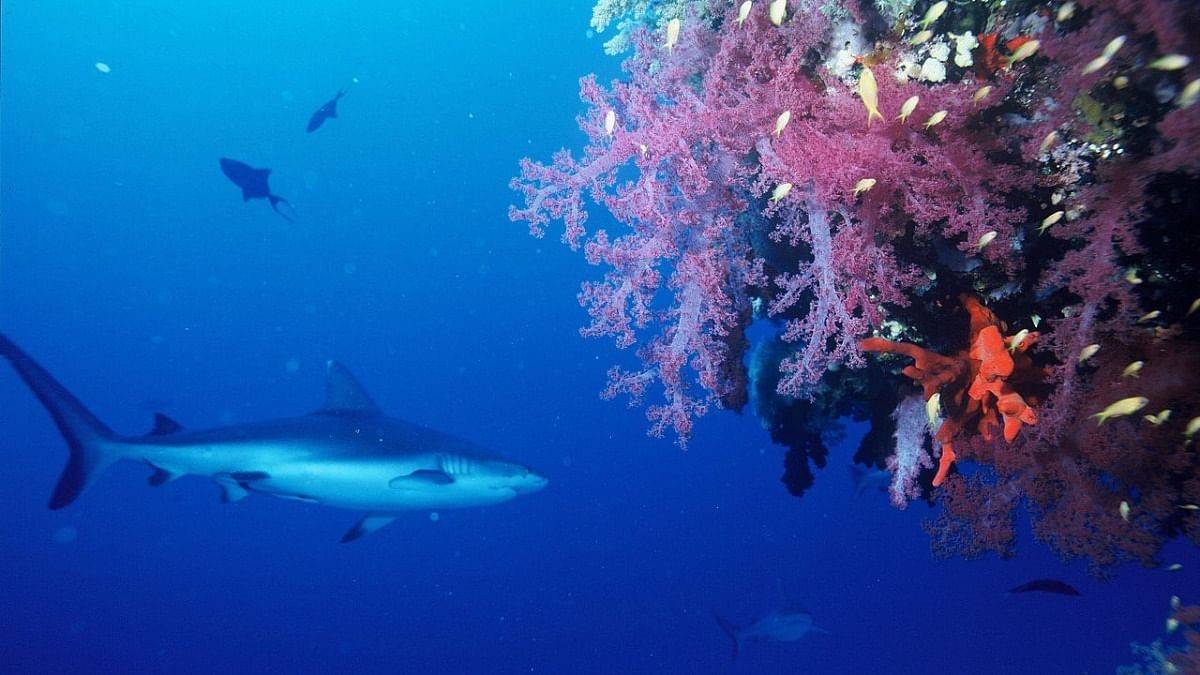Description

Disclaimer: Copyright infringement not intended.
Context
- The study, findings published in the Science journal, was conducted in 391 coral reefs spreading across 67 countries of the world.
- It was undertaken as a collaboration called Global FinPrint project.
- It studied 5 key species of reef sharks namely –
- Caribbean reef shark
- Nurse shark
- Grey reef shark
- Blacktip reef shark and
- Whitetip reef shark
- This study highlighted the decline in reef sharks population by collecting and analysing video footage.
Other Details
- It was found that there is a decline of 60 to 73 per cent in these five key species’ population.
- Geographical areas covered were extending to
- Indian Ocean off East Africa
- Australia’s Great Barrier Reef
- clusters of coral in the Caribbean
- Apart from these reef sharks, one-third of all sharks, ray, and other related species are also on the risk of extinction due to declining population.
- In the surveyed 391 reefs, in 34-47%, individual shark species was not found.
- In some places, sharks were not detected in 13.6 per cent of reefs at all.
- Most affected areas were –
- Asia
- Eastern Africa
- South America, and the
- Central-eastern Caribbean
.jpeg)
Reef Sharks
- They are known by the scientific name Carcharhinus perezii.
- In marine ecosystems these sharks are considers indicator species and are the top predators of the coral reefs.
- There are many species of sharks found in reefs some of them are –
Habitat
- Shallow Tropic or subtropical water of coral reefs.
- That is shallow ocean regions close to the shore.
- Mangroves.
- Sea grass beds.
Significance
- These are very significant to coral reef system.
- They help in maintaining food webs.
- Nutrients cycling is also supported by them.
- They can promote economy by giving a push to tourism industry.
Conservation Status
- Current IUCN status is Near threatened.
- However study finds that these five key species should be classified as threatened as per International Union for Conservation of Nature Red List of Threatened Species.
Threat
- Overfishing is the key threat.
- They are killed for meat, leather, liver oil, and fishmeal.
- It leads to the domination of ray instead of shark which ultimately led to decline of both sharks and rays.
- Other marine activities which pollute the oceans.
- Degradation and destruction of Natural habitat.
Measures to be taken for conservation
- Right management techniques.
- Reefs could be converted or declared protected areas.
- Special programmes to conserve them like in Philippines and Indonesia.
- Enforcing rules and related regulations.
- Involvement of fishermen and sensitizing them about this ecological issue.
|
Indicator Species
- These are living organisms whose presence or absence indicates the changes in environment and the particular ecosystem.
- These living organisms could be plants, animals or microorganisms.
- These organisms are highly sensitive to any environmental changes.
- Hence any negative changes in such species growth, health or population indicate environmental stress.
- On the other hand good and healthy presences of them indicate the wellbeing of ecosystem and environment. For eg. Lichens.
|
Must read Article:
https://www.iasgyan.in/daily-current-affairs/coral-reefs
https://www.iasgyan.in/blogs/coral-reefs-around-the-world
https://www.iasgyan.in/daily-current-affairs/great-barrier-reef-40
|
PRACTICE QUESTION
What are indicator species? Explain in context of reef sharks. By highlighting the threat reef sharks are facing, Elaborate how they play a key role in sustainability of the coral reef ecosystem.
(150 words)
|

https://theprint.in/environment/reef-sharks-pushed-to-extinction-by-overfishing-up-to-73-decline-in-5-common-species-globally/1631418/











